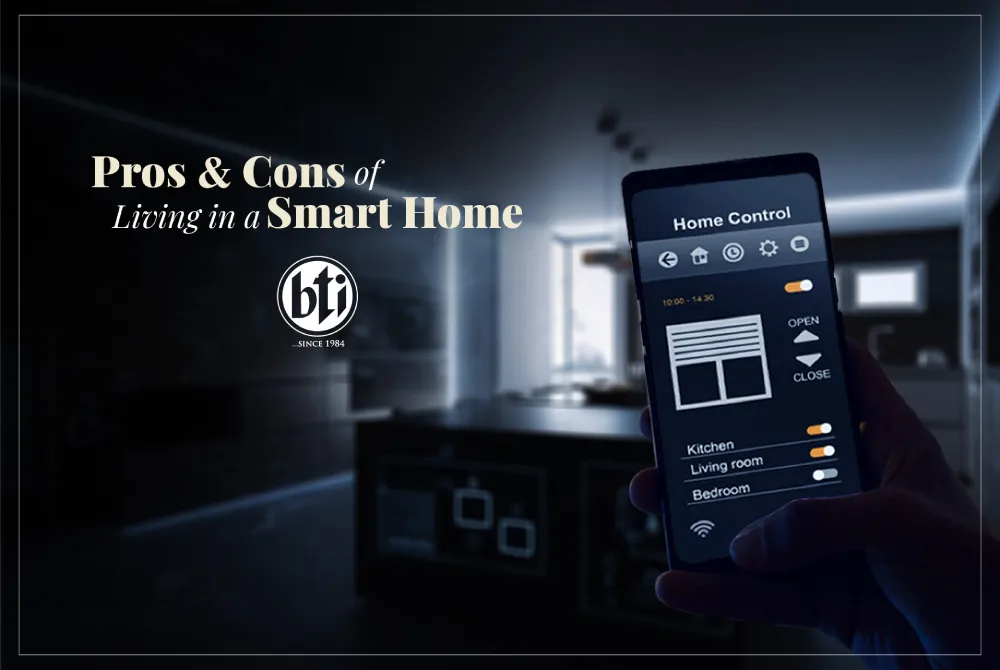
In the ever-evolving landscape of modern living, the concept of a “smart home” has become increasingly prevalent. With features such as thermostats that adapt to personal preferences and voice-activated assistants that handle daily tasks, technology has undeniably revolutionized our interaction with our living spaces. Nevertheless, like any progress, transitioning to a smart home lifestyle has its own benefits and drawbacks. Let us explore the advantages and disadvantages of embracing this innovative way of living.
Pros
Convenience and Efficiency: A smart home provides an exceptional level of convenience, which is one of its most notable advantages. By utilizing automated systems to control different aspects of your home, simple tasks like adjusting the temperature, switching off lights, or even ordering groceries can be easily handled through voice commands or smartphone applications. This efficient and streamlined approach saves time and improves the overall effectiveness of daily routines.
Enhanced Security: Smart home integration frequently encompasses advanced security systems that offer homeowners a sense of tranquility. Ranging from surveillance cameras equipped with real-time monitoring to remotely controllable smart locks, these cutting-edge technologies provide enhanced safeguards against intruders and unauthorized entry, thereby greatly reinforcing residential security.
Energy Savings: Smart thermostats and energy-efficient appliances play a crucial role in the management of smart homes. These systems effectively decrease utility costs and lessen environmental harm by adjusting energy consumption according to occupancy and personal preferences, thus supporting sustainability while maintaining comfort levels.
Remote Monitoring and Control: Monitoring and managing your home from afar is a significant advantage, whether you are at the office or exploring foreign lands. Smart home solutions empower individuals to oversee security cameras, modify preferences, and stay informed about any possible concerns, enhancing overall control and promptness, regardless of your location.
Customization and Personalization: Smart home technology offers unmatched customization options, empowering homeowners to personalize their living spaces according to their specific preferences and lifestyles. Whether it’s adjusting lighting to set the mood or establishing personalized routines, the flexibility of smart devices guarantees a tailored experience that meets individual requirements.
Cons
Initial Cost and Complexity: The initial expense associated with incorporating smart home technology may be too high for certain homeowners. Buying devices that are compatible with each other and paying for installation and setup can discourage people from embracing a complete smart home system. Moreover, the difficulty of handling various devices and platforms can present obstacles, particularly for individuals who are not as tech-savvy.
Privacy Concerns: The increasing number of interconnected devices that gather extensive data raises significant concerns regarding privacy in smart homes. Whether it is voice recordings or behavioral patterns, the collection of personal information gives rise to worries about data security and the possibility of breaches. It is crucial to implement strong privacy measures and maintain transparent data practices in order to address these risks effectively and protect user privacy.
Reliability and Compatibility Issues: Even with the progress in technology, smart home devices can still experience glitches and compatibility issues. Whether it’s software bugs or connectivity problems, these malfunctions have the potential to disrupt the smooth operation of these systems and erode user trust. Moreover, the absence of standardization across devices made by various manufacturers can create challenges in integrating and ensuring interoperability, making it essential to carefully choose compatible products.
Dependence on Connectivity: The functionality of smart homes is greatly dependent on internet connectivity and a stable network infrastructure. Power outages or disruptions in internet service can lead to difficulties in accessing or controlling smart devices, causing inconvenience. Additionally, the importance of strong network security measures is emphasized by concerns about cybersecurity vulnerabilities, aiming to safeguard against potential threats and unauthorized access.
Over-reliance on Automation: Although automation has the potential to simplify daily activities, excessive dependence on advanced technology might lead to a decline in crucial life skills and interpersonal relationships. Depending entirely on automated processes for handling household tasks and making choices could weaken independence and critical thinking skills, prompting a discussion on the trade-off between convenience and self-reliance.
Ultimately, achieving a harmonious integration of smart technology into our homes and lives requires addressing challenges such as initial costs, privacy concerns, and reliability issues. While the transition to a smart home lifestyle offers numerous benefits like convenience, security, energy savings, and customization, it is essential to embrace best practices in smart home management. As technology advances, striking a balance between technological advancements and human values will be key to unlocking the full potential of this innovative living concept.